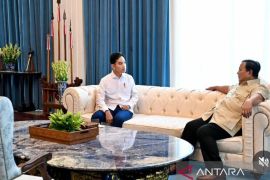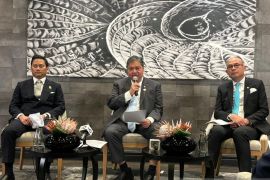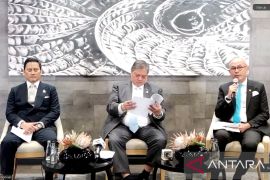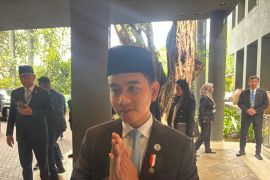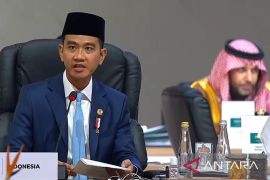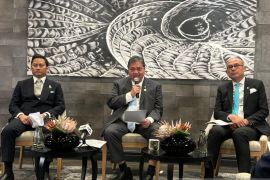The COVID-19 pandemic has killed millions, hunger and poverty are rising, and years of development gains are being lost. Added to this, a multi-faceted war is raging in the heart of Europe, in violation of the United Nations Charter.
It is in the backdrop of these unprecedented challenges that the G20 Foreign Ministers’ Meeting (G20 FMM) convened in Bali this year to discuss the global impact of the Russian invasion of Ukraine, its consequences on inflation, economic security, international energy markets, as well as peace and security.
The meeting themed "Building a more peaceful, stable, and prosperous world together" was expected to serve as a strategic forum for discussing global recovery efforts.
To meet this expectation, the G20 FMM was conducted in two main sessions. The first session on strengthening multilateralism discussed joint steps to strengthen global collaboration and build mutual trust among countries to create an enabling environment for world stability, peace, and development.
Meanwhile, the second session of the G20 FMM on food and energy security discussed strategic steps to overcome the food crisis, fertilizer shortage, and rising global commodity prices.
"Rising commodity prices and disruption of the global supply chain have had major impacts on developing countries. For this reason, the G20, as an economic forum representing various regions of the world, has the power to discuss these issues comprehensively to find sustainable socioeconomic solutions," Indonesia's Foreign Affairs Ministry said in a statement.
During the first session, UN Secretary General Antonio Guterres shared his views on the empowerment of multilateral principles and forums amid the prevailing geopolitical situation.
"Strengthening multilateralism—the theme of this session—is not a choice, but a necessity. It is the only way to avoid widespread food shortages, deepening climate chaos, and a wave of poverty and destitution that will leave no country untouched," Guterres said in a video message to the G20 foreign ministers.
The UN Secretary General argued that the current complex and interconnected world requires multilateralism that is more effective, more networked, and more inclusive.
"We need to combine the strengths of existing institutions to deliver together on humanity’s most pressing challenges," he said.
Guterres then proposed biennial summits to bring together the G20, the Economic and Social Council of the UN, international financial institutions, and the UN Secretary General’s office to work towards a more sustainable, inclusive, and resilient global economy.
"Strengthening multilateralism is the only sustainable path to a peaceful, stable, prosperous world for all ... And the G20, representing 80 percent of global economic power, can make them a reality," he remarked.
Solutions for global challenges
Indonesian Foreign Affairs Minister Retno L.P. Marsudi, in her opening speech at the G20 Foreign Ministers’ Meeting, emphasized that the G20 must find solutions to various global challenges.
"Only then can the G20 become relevant and useful for the world, not only its members," she said at the meeting in Nusa Dua, Bali, on Friday.
During the meeting, she outlined the problems facing the world today, including the food and energy crisis triggered by the war in Ukraine and the ongoing COVID-19 pandemic.
The effects of the war are also being felt by developing and low-income countries, with global growth projected to slow to 2.9 percent by 2022 and inflation expected to reach 8.7 percent for developing countries, she noted.
Therefore, Indonesia, as the president of the G20, this year has chosen to raise the issue of multilateralism at the G20 FMM to emphasize the importance of cooperation between countries to respond to global challenges.
"Global challenges require global solutions. But, to be honest, we cannot deny that it is getting harder and harder for the world to sit down together," Marsudi said.
All countries have a responsibility to maintain and realize multilateralism, where all countries stand as equal and are treated equally, she added.
To that end, the Indonesian G20 Presidency has, for the first time, invited representatives from developing countries and small island countries, including members of the Pacific Island Forum and the Caribbean Community as well as the African Union, to G20 meetings.
"Because in this polarized world, their interests are also important and their concerns are also our concern," Marsudi remarked.
Furthermore, she stressed the importance of building mutual trust so that multilateral mechanisms can work to respond to global challenges.
"Therefore, let's use this opportunity to discuss how we can build trust and ensure multilateralism works, how to bring about peace, and prevent the crisis from turning into a new global disaster," she said.
While issuing a press statement at the conclusion of the G20 meeting, the minister said that all participants shared the same view that trust among nations is important to create a conducive environment for peace and stability.
"There is a strong force from many participants for an immediate end to the war and peaceful resolution of conflict through diplomacy and negotiations," she added.
At the foreign ministers’ meeting, participants also raised concerns over multilateralism coming under threat and increasing hurdles to responding effectively to global challenges.
“The participants agreed that there is an urgent need to strengthen multilateralism," she pointed out.
The Indonesian Foreign Minister also emphasized that multilateralism remains the best way to address global challenges.
"Cooperation in pandemic response, including and ensuring equitable access to vaccines is one of multilateralism success stories," she said.
"Political will and global collaboration are critical to ensure multilateralism delivers and benefits all countries," she remarked.
Related news: Russia lauds Indonesia's role at international forums
Related news: Ending war in Ukraine global responsibility: Minister Marsudi
Editor: Rahmad Nasution
Copyright © ANTARA 2022

